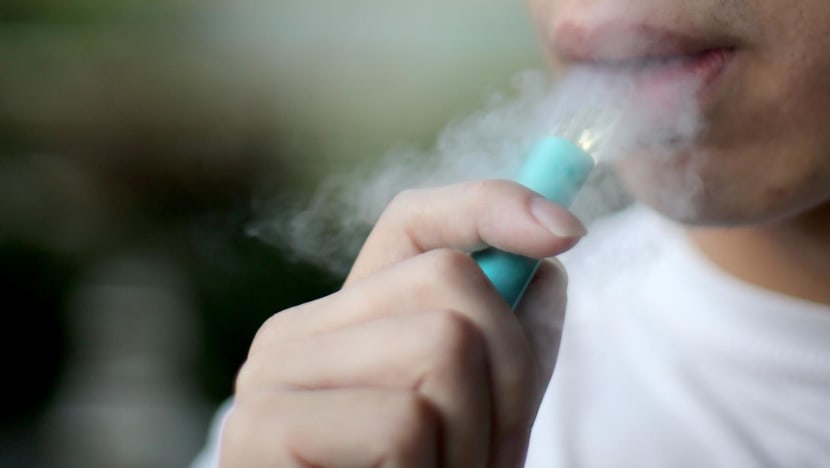Commentary: How much will enhanced enforcement stamp out vaping in Singapore?
Authorities are ramping up efforts to enforce Singapore’s ban on vapes, but people will risk using the devices as long as they perceive that it isn’t a serious offence, says smoking cessation counsellor Sean Ang.


This audio is generated by an AI tool.
SINGAPORE: Vaping-related offences are on the rise in Singapore, despite a ban on vaping in place since 2018. Authorities dealt with 8,000 offences in 2023, 43 per cent more than that recorded in 2022.
In December 2023, it was announced that authorities will step up checks at border checkpoints for e-vaporisers and their components, and at “public hotspots” to catch vapers. It is hardly surprising then that from Jan 1 to Mar 31, more than 2,200 people were found using or owning vapes.
To curb the rising number of youth vapers, the Ministry of Health and the Health Sciences Authority announced that students caught for first-time vaping offences may be fined up to S$2,000 (US$1,480).
It is timely that authorities ramped up efforts to enforce Singapore’s ban on vapes, because the existing perception is that enforcement levels are insufficient as a deterrence.
With rising levels of vaping in Singapore, how effective would enhanced enforcement be in deterring new and existing vapers?
WILLING TO RISK GETTING CAUGHT
Of course, with enhanced enforcement, some people who used to vape openly might now do it privately instead of stopping altogether.
But the possibility that more users will vape behind closed doors is no reason for authorities to hold off from stepping up checks at public hotspots. If authorities were to turn a blind eye, it would suggest that the status quo is fine.
The crux of the issue is that whether openly or privately, people still choose to vape because they are unafraid of the repercussions of getting caught.
One hundred per cent of my clients knew that vaping is illegal, but were willing to take the risk. Many saw the consequences for the purchase, use and possession of vaping devices - which carries a maximum fine of S$2,000 - as a slap on the wrist.
When they do not receive the maximum fine as a first-time offender, it adds to the sense that vaping isn't being treated seriously as an offence.
WOULD A CRACKDOWN STOP VAPERS FROM SEEKING HELP?
Some smoking cessation counsellors have shared that their clients are evasive about their vaping habits, given that it’s against the law. One can imagine that strengthened enforcement efforts may make vapers wary of seeking help.
However, the Ministry of Health stated in 2022 that persons who wish to quit vaping will not be penalised when they seek professional help or participate in cessation programmes.
In my experience, clients come to me wanting to quit vaping not because it is illegal, but because of long-term costs and health issues, among others. These reasons seem to outweigh the worry of getting caught.
Another potential ramification of a clampdown on vapes is that vapers may switch to cigarettes instead, which are legal for those aged 21 and above.
Considering that some vapers end up consuming more nicotine when vaping than smoking cigarettes, from the perspective of addiction, they might actually be reducing their dependence on nicotine.
However, some health authorities such as the US Centers for Disease Control and Prevention find that e-cigarettes generally produce fewer harmful chemicals compared to cigarettes. But vapes are not safe - they contain toxins that can increase the risk of developing respiratory and cardiovascular conditions.
In any case, we might just end up transferring the addiction type from one to another. The end goal has to be a clear path to nicotine cessation, not just smoking cessation.
REHABILITATING VAPERS BESIDES PUNISHING THEM
Enforcing a ban on vapes isn’t as straightforward as it sounds. If our aim is to treat and rehabilitate the vaper before charging them in court, other services have to be ready to support the increased numbers of vapers being caught.
Smoking cessation counsellors, welfare officers, social workers, teachers and school health advisors are all needed to support individuals in their vaping cessation journey.
It is worth considering whether vapers with financial needs should be offered support with professional services before they are penalised financially. In addition, there could be merit in assessing whether repeat offenders for the possession, use and purchase of vapes should be managed differently from first-time offenders.
The support structure of clients undergoing nicotine cessation therapy is critical to their chances of success. Without that structure, the chances of success decline dramatically.
THE JOURNEY TO HARM ELIMINATION
Singapore appears to take the stand of harm elimination, rather than harm reduction, which is the reason for the outright ban on vaping devices. The challenge is for companies to develop pharmaceutical products, such as those used in nicotine replacement therapy, with a demonstrated ability to wean people off nicotine.
Singapore’s enhanced efforts to snuff out vaping are welcome. The perception of the level of enforcement is that it is still insufficient, and therefore people are willing to take the risk to use these devices. Yet, there are limitations based on the existing enforcement structure and the readiness of support services.
We can all do more to realise our goal of a nicotine-free society.
Sean Ang is a smoking cessation counsellor and pharmacist, Success Alliance Enrichment.


















